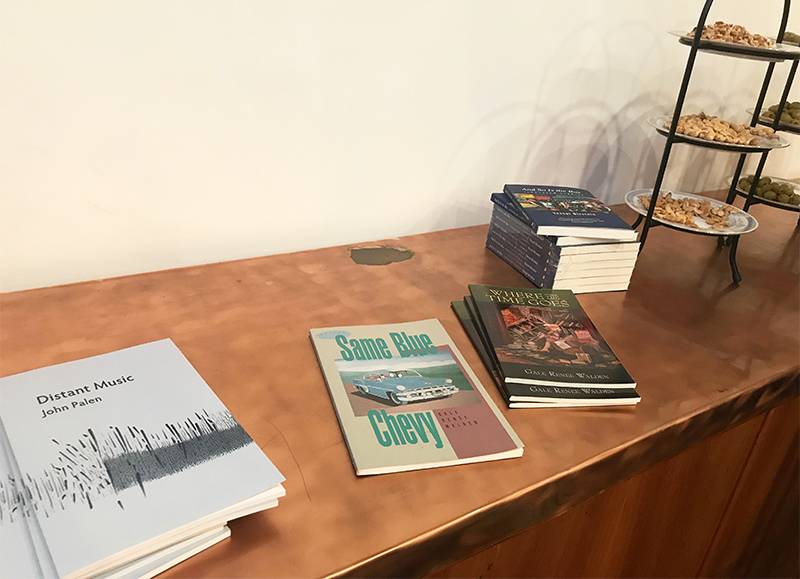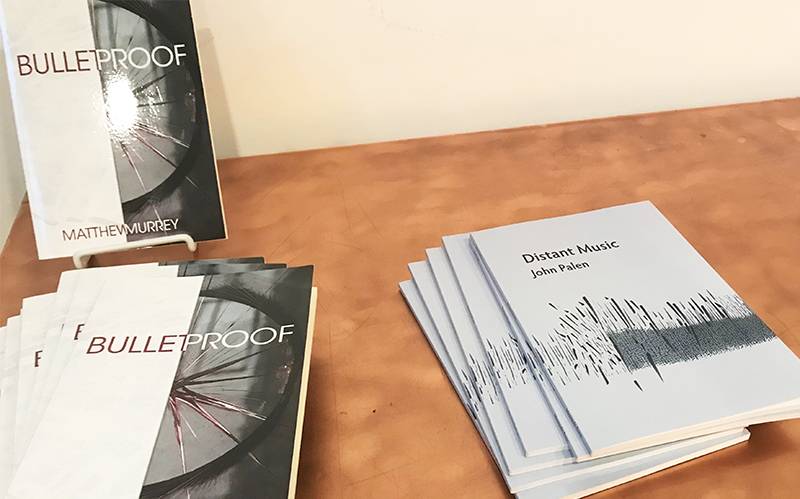Prior to their recent spring reading at Analog, I introduced you to a few members of The Glass Room Poets. We learned how the group started and got its name. And, we spoke about life as a poet, the process, and the invaluable benefits of a well-oiled writing group.
Our conversations continued and expanded even beyond what was an unforgettable night of poetry (more about that in a minute). After experiencing their combined and unique brands of magic, I happily share more from these men and women who have helped put Chambana on the map as literary town of note. They may just change the way think about poetry.
The Glass Room Poets spring reading at Analog was perhaps the closest we in 2019 Chambana will get to the feeling of a literary salon. And in contrast to the still-raw quality of the reading/event space, the poems shared, even the new ones, reflected a level of insight and mastery of craft that are rarely found in one, let alone, seven poets.
It is also quite rare to find a group of writers who, while strong in their unique voices, share a sensibility that brings a cohesiveness to group readings. As Julie Price Pinkerton said after the reading, “there’s not a weak link in the bunch.” There is something in the way they introduce each other, or listen to each other read, that speaks of a deep bond between them. There is respect, there is gratitude, and for this particular reading, there was a shared preoccupation with the weather—which, I suppose, is to be expected from a group of prairie poets. Rain featured prominently in many poems that night. It appeared as a tempest, a threat, a release, a resetting and an ablution.
For someone who loves language as much as I do, this was a feast of words, sounds, and meaning that took me to far away places and forgotten memories. Most surprising was how much I laughed. The Glass Room Poets are smart (e.g., published and award-winning), well-spoken, animated in their readings, and hilarious in various and often surprising ways. Dark and bittersweet, conversational and familiar, and, even, joyfully rebellious. Price Pinkerton was quick to remind me that poetry is often and should often be funny. This is something she works hard to instill in her University of Illinois creative writing students. A night with these poets will teach you many things and make you feel many ways; but one important lesson is this: poetry readings can be fun.
Spring is an important season for this group of poets. For many, especially those who teach, it marks the shift from student-centered focus to poet-centered focus. Sadly, they only read once a year. Which is just one more reason to check out their work online or in bookstores. More information about this will follow.
 It is with great pleasure that I introduce you to poets Matthew Murrey and Elizabeth Majerus (also of Motes). If you are a poet or writer of any kind, they offer wisdom, insight, and inspiration. Best of all, they are real. They remind us that art of any kind is work. And like most work, its load become lighter and its rewards richer when shared with trusted colleagues. So check out their interviews; and then go read their work.
It is with great pleasure that I introduce you to poets Matthew Murrey and Elizabeth Majerus (also of Motes). If you are a poet or writer of any kind, they offer wisdom, insight, and inspiration. Best of all, they are real. They remind us that art of any kind is work. And like most work, its load become lighter and its rewards richer when shared with trusted colleagues. So check out their interviews; and then go read their work.
Smile Politely: It’s so important to hear poetry read aloud. It makes the work so much more accessible and immediate. But it also requires a separate set of skills. How do you prepare?
Matthew Murrey: Once I’ve picked the poems, I read and re-read them seveal times so I’m comfortable and very familiar with them. I really try to think about how it is for a listener hearing them without a copy in front of them and consider if there are any details in the poem that might need some introductory remarks.
SP: Do audience responses impact your process or your sense of what’s working (or not working as well) in a given piece?
Murrey: I love to connect with an audience. I talk my poems out loud when I’m working on them and revising them—I want them to sound interesting as well as be interesting, thought provoking and even entertaining.
Smile Politely: How does being a part of this group support your process?
Murrey: The individual perspectives of the group can become these little voices in my head as I write. So I might think to myself, “So-and-so would suggest I start the poem here,” or “So-and-so would ask do I really need those last two lines,” etc. That helps.
SP: What are the biggest challenges, or opportunities of being a poet today?
Murrey: Finding an audience. Evolving as a writer. Living in a crass, market-driven, mean spirited country is tough.
SP: Can you tell us about your process?
Murrey: Read, read, read. Listen to a lot of poetry. I get up every weekday at 4:30am and write for a couple hours.
SP: What inspires you?
Murrey: Bravery. People who stand up to abusive power. The power of language. The way that people all over the world love art and will risk so much to make and enjoy it.
Find out more about Matthew Murrey on his website, where you can also find links to his recent book.
Elizabeth Majerus shared her thoughts about reading in front of an audience, the almost alchemical process of “workshopping” new poems with this particular group, her process and what it means to be a poet today.
I agree that poetry needs to be heard, and also that the skills involved in writing wonderful poetry don’t necessarily translate to reading poetry in an engaging way. I’ve certainly been to readings by poets I love to encounter on the page and been disappointed by a poet’s lackluster reading of their own poems. It’s hard to articulate a set of skills that make for a good reader, through. There are so many ways to read a poem well (and various ways, I guess to read one badly). I guess I would say trying to make the poem live and breathe, trying to bring whatever music it has sonically to life. I think reading in a resonant, clear voice that can be heard in the back is important. And taking your time. Not rushing, attending to the pauses and spaces in the poem.
Audiences can definitely affect my sense of a poem’s power or what’s working within it. At the same time, there are poems that are reading friendly and others that aren’t as much. A poem might really succeed at a ready and not be as interesting on the page. Or a poem might be incredibly powerful but hard to get across in one reading out loud.
Getting feedback from other writers you trust is an incredible gift. I always come away with Glass Room meetings full of ideas for revision and new angles on a poem. Meeting regularly with a good writing group is also simply a good motivator––you write the poem because you want to have something to bring.
My process varies. Mostly I try to sit my ass in the chair and write, and keep coming back to seeds and shaping them into fuller poems, and when I don’t feel like writing or don’t have a seed, I revise. And I keep doing that, over and over.
The world inspires me, people, music, food, color, things that confuse me inspire me, sound inspires me. Looking out the window inspires me.The biggest challenge today is competing with a lot more noise than ever in our world. The biggest opportunity is probably having so much great poetry to read and hear. You can find poets reading their own work online, there are amazing poetry-centric podcasts (like the Poetry Foundation’s VS podcast, hosted by Danez Smith and Franny Choi, which I highly recommend), and there are many, many wonderful publications and presses that the internet makes it easy to find.
Additional resources:
- You can read some of Elizabeth Majerus’ work here.
- Read more about Robert Manaster here.
- Check out John Palen’s “Distant Music,” here.
- Learn more about Julie Price Pinkerton and her work here.
- Read one of Gale Walden’s poems here, or find out more about her work here.
Photos by Debra Domal








